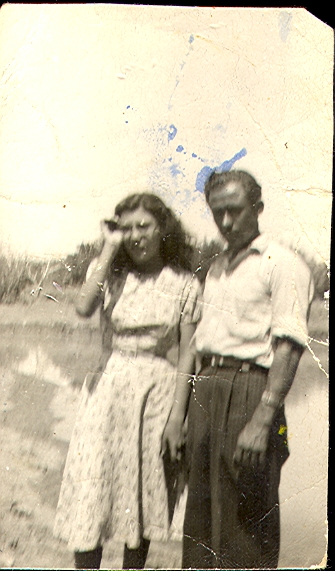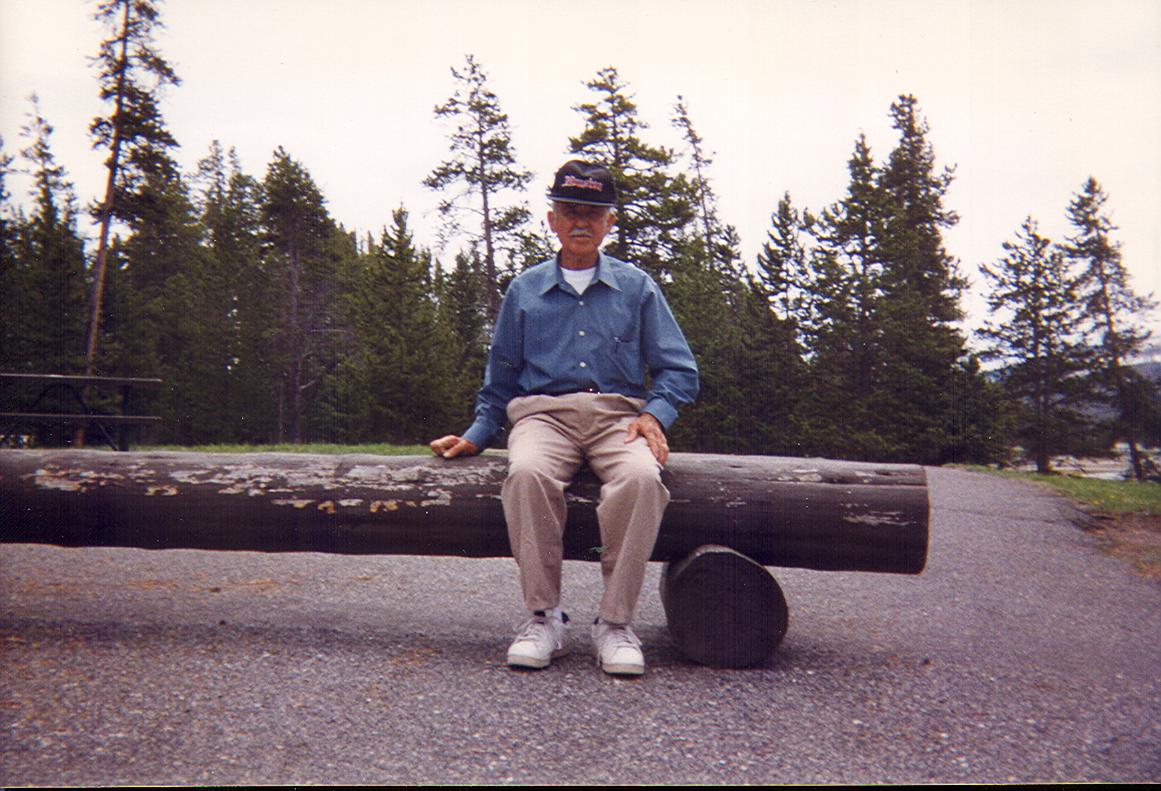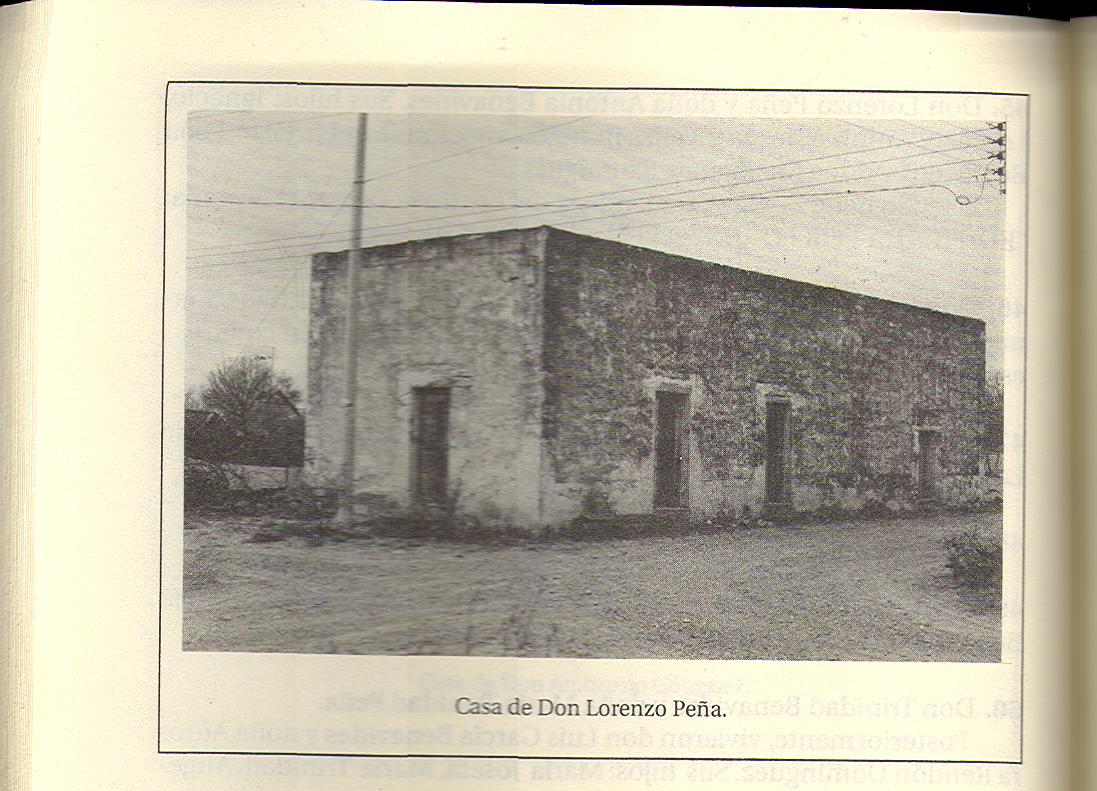Jose P. Gonzalez

San Antonio , TX
June 2005
Ralph C. Gonzalez
Palo Alto College
History 1302 - Summer 2005
INTRODUCTION
Born on September 15th, 1918 Jose Pilar Gonzalez will be 87 this September. Jose was born in a small ranching community called San Rafael Paso de las Tortillas in the state of Tamaulipas. He was born to Zaragoza Rendon Gonzalez (Gocha) and Maria de Los Angeles Pena (Angelita). He was the third child but the first male born to them. Hortencia, Angelica, Jose, Candelario, Bertha, Ramiro, Oscar, Roberto, Rosalina, and Daniel along with their parents lived at the ranch until Jose decided to take the family to Nuevo Laredo. Jose had gone off to work in a few cities in Mexico. He had worked as a farmer in Guerrero (Tamaulipas) and a rancher in Gomez Palacios (Torreon). When he returned to the Ranch he built a few homes (adobe) for some of the residents but longed for a better home for his family. He had been to Nuevo Laredo and thought this was a good place to settle. Jose met his future wife in Nuevo Laredo. Married in June of 1949 the pair set out to find a better way of life in the US.
TRANSCRIPTION
How did you pass the day when you were young?
Jugabamos a las caretias, las canicas, y a los trompos.
We played pushing carts, Marbles, and spun our tops.
Did you play anything else?
Jugabamos in el Rio, nathando y tomado un tiempo para descansar
We played and swam in the River and took some time to rest.
Did you fish in the river?
Si, pero no habia tanto pes. Lo que si me acuerdo pescando era unos cuanto puentes que se los habia llevado una tromba.
Yes, but there was not too many fish in the water. I do remember catching some bridges once when there was a wall of water that came down the river.
So, there was a flood at the ranch?
No no uvo enundacion en las Tortillas, se enundio camaron y se llevo todos los puentes.
There was not a flood at Las Tortillas, the flood took place in Camaron. It was there where all the bridges came from.
What did you do with all the bridges?
Todo los puentes se los ventimos para tras a la gente que le pertenencia. me pagaron como 9 pesos y con eso compre una vaca.
We sold all the bridges back to the people to whom they belonged. I made around 9 pesos and bought a cow with the money.
What type of education did you recieve?
nuestra escuelita era de 6 grados yo fue 4 veses al 6 para recibir mas educacion.
Our school was up to the 6th grade. I went to the 6th grade 4 times to recieve more education.

What type of occupations were there at the Ranch?
Podeas sembrar en tu labor, O tener vacas, y chebas. Tu tio Lalo y Yo los pusimos a ser casas de Adobe
You could be a farmer of land or raise cattle and goats. What your uncle Lalo and I did was make homes out of
Adobe.
How did you make these homes?
Teniamos unas formas de como 16 piez por 12 pulgadas. primereo mesclabamos el socete, y despues lohechabamos a las formas. Ya duras las dehabamos afuera para que se secaran. Ya secas las poneamos como ladriyos.
We had some forms that were about 16 feet long by 12 inches wide. First we would mix the mud and then pour the mud into the forms. once the mud was hard we would take it out of the form and set it out to dry. Once dry we would lay the Adobe like brick.
How old were you when you started making houses?
Tenia yo como unos diez y siete. Tu tio como unos quinse o diez y seis.
I was around seventeen. Your uncle was about fifteen or sixteen.
What made you want to leave the Ranch?
Mi Madre se infermo y como yo era el mayor (de los hombres) me la traje asta Nuevo Laredo para ver al Doctor. Ya en Nuevo Laredo hable con mi Tio Manuel Pena. El me dijo “Que estan aciendo aya Gocha? Porque no se vienen? Dejen ese mugrero aya. Entonces fue y compre un solar en Nuevo Laredo para ser una casa. Yegando a la Rancho le deje a todos quecomensaran a empaqar.
My mother got sick so being the oldest male I took her to Nuevo Laredo to see the Doctor. In Nuevo Laredo I spoke with my Uncle Manuel Pena. He asked me what were we still doing at the Ranch? Why don’t you come? Leave that junk over there. So I went and found a lot and bought it. When I got to the Ranch I told everyone to start packing.
What did your father have to say about that?
Me dijo que estaba loco. Que vamos acer en Nuevo Laredo? Le dije Vamos a trabajar.
He told me that I was Crazy. What are we going to do in
Nuevo Laredo? I told him we were going to work.
What year was it when you got to Nuevo Laredo?
Llegamos entre el Cuarenta y Dos o Cuarenta y Siete.
We got there sometime between 1942 and 1947.
What type of work did you get when you got to Nuevo Laredo?
Mi hermano Ramiro consigio trabajo engrasando caros y trocas. Lalo y yo nos pusimos acer la casa.
My brother Ramiro went to work lubing cars and trucks while Lalo and I started building the house.
What about afterwards?
Consige trabajo checando anorias de agua para una radiofosoria
I found work checking water wells for a radio station.
How long did you stay in Nuevo Laredo?
Estuve en Nuevo Laredo asta cuando me case con tu Mama en junio del 1949.
I stayed in Nuevo Laredo til 1949 when I married your mother.
What made you want to imigrate?
Que mas ..El dinero
What else.. the money.
Was it hard to imigrate when you did?
No, tu Mama era cuidadana americana, poreso no tuve problemas.
No, your Mom was an american citizen so imigrating was not very hard.
Did you Imigrate to the U.S. strictly for work?
No me imigre para quedarme.
No, I imigrated to stay.
How did you feel when they told you that all your paper work was in order for your imigration?
Me senti con mucho gusto, ya podia trabajar en los estados unidos.
I had a lot of joy, now I could work in the U.S.
How long did it take before you felt like an american?
Luego luego me senti como un americano.
I felt like an american right away.
Did you take classes to try to be more american or learn english?
Si, anduve tomando clases en todo San Antonio pero nunca se me pego.
Yes I took classes all around San Antonio, but was never able to learn English.
If you had not imigrated to the U.S. where do you think you would be right now?
Estuvieramos trabajando en las labores esperando que salia lo que sembrabamos.
We would be working on the farm waiting around for what we planted to grow.
Have you ever thought about going back to Mexico, even just to retire?
Nobre que crees, ni para cuando
No way, what are you thinking? Never

ANALYSIS
I learned many things from this Oral History. The most important was that of self-sufficiency. My Dad built not only the house that his family lived in while in Nuevo Laredo, but also built his house here in San Antonio He found work even though he could not speak English. He even started his own business as he retired from his longtime job with a large roofing company here in San Antonio. He has taught many things and the most important was to follow your dreams even if everyone else says your Loco.
ANNOTATED BIBLIOGRAPHY
The Handbook of
Texas Online Copyright © The
Michael Yoder, Principal Officer Nuevo Laredo Information (2005).
Printed Source
To cite printed source, give the author's name, last name first (if known);
the full title of the source, place of publication, publisher's name and the
date of publication. The citation concludes with a brief description of the
printed source.
Santoyo, Mario Manuel Escoto
Herencia Mestena Theodor
